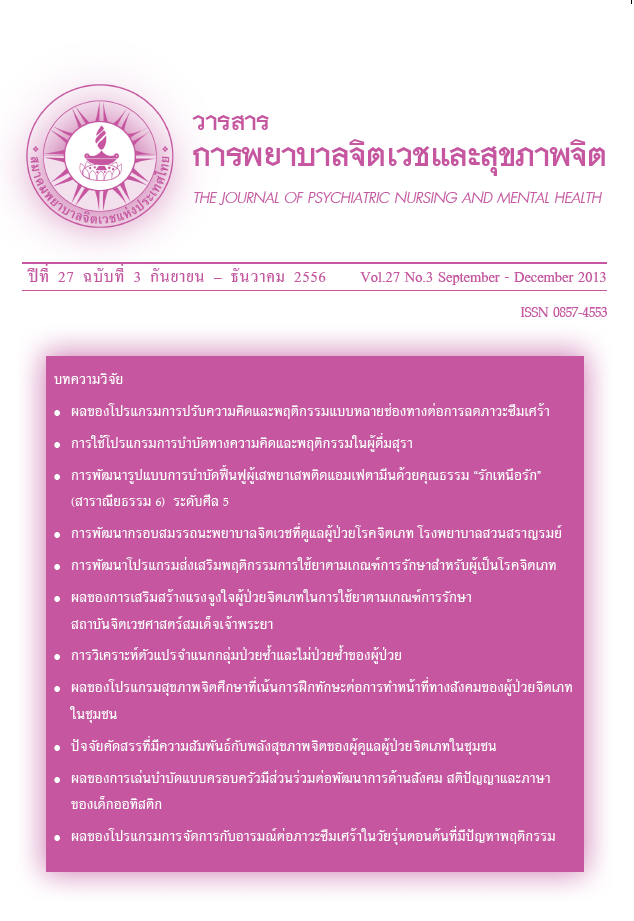ผลของการเล่นบำบัดแบบครอบครัวมีส่วนร่วมต่อพัฒนาการด้านสังคม สติปัญญาและภาษาของเด็กออทิสติก
Main Article Content
บทคัดย่อ
การวิจัยกึ่งทดลองนี้มีวัตถุประสงค์เพื่อ เปรียบเทียบพัฒนาการด้านสังคม สติปัญญาและภาษา ของเด็กออทิสติกก่อนและหลังได้รับการเล่นบำบัดแบบครอบครัวมีส่วนร่วม และ เปรียบเทียบพัฒนาการด้านสังคม สติปัญญาและภาษาของเด็กออทิสติกหลังได้รับการเล่นบำบัดแบบครอบครัวมีส่วนร่วมกับกลุ่มที่ได้รับการพยาบาลตามปกติ กลุ่มตัวอย่าง คือ ผู้ป่วยเด็กออทิสติกที่รับการรักษาแบบผู้ป่วยในแบบ ไป-กลับ โรงพยาบาลยุวประสาทไวทโยประถัมภ์ ที่มีคุณสมบัติตามเกณฑ์ จำนวน 40 คน กลุ่มตัวอย่างได้รับการจัดเป็นคู่ ที่มีระดับความรุนแรงของโรคเท่ากันและอายุใกล้เคียงกัน จำนวน 20 คู่ จากนั้นจึงสุ่มเข้ากลุ่มทดลอง และกลุ่มควบคุม กลุ่มทดลองได้รับการเล่นบำบัดแบบครอบครัวมีส่วนร่วม เป็นเวลา 7 สัปดาห์ ส่วนกลุ่มควบคุมได้รับการพยาบาลตามปกติ เครื่องมือที่ใช้ในการวิจัย ได้แก่ 1) คู่มือการเล่นบำบัดแบบครอบครัวมีส่วนร่วม 2) แบบประเมินพัฒนาการด้านสังคม สติปัญญาและภาษาของเด็กออทิสติก 3) แบบประเมินความสามารถในการเล่น และ 4) แบบตรวจสอบการมีส่วนร่วมของครอบครัวในการเล่นกับเด็กที่บ้าน เครื่องมือทุกชุดผ่านการตรวจสอบ ความตรงเชิงเนื้อหาจากผู้ทรงคุณวุฒิจำนวน 5 คน ค่าความเที่ยงสัมประสิทธิ์อัลฟาของครอนบาค ของแบบประเมินพัฒนาการด้านสังคม สติปัญญาและภาษา เท่ากับ .91 วิเคราะห์ข้อมูลโดยใช้สถิติทดสอบที (t-test)
ผลการวิจัยที่สำคัญ สรุปได้ดังนี้ 1) คะแนนเฉลี่ยพัฒนาการด้านสังคม สติปัญญาและภาษาของเด็กออทิสติกหลังได้รับการเล่นบำบัดแบบครอบครัวมีส่วนร่วมเพิ่มขึ้นกว่าก่อนได้รับการเล่นบำบัดอย่างมีนัยสำคัญทางสถิติ (p<.05) 2) คะแนนเฉลี่ยพัฒนาการด้านสังคม สติปัญญาและภาษาของเด็กออทิสติกที่ได้รับการเล่นบำบัดแบบครอบครัวมีส่วนร่วมเพิ่มขึ้นมากกว่ากลุ่มที่ได้รับการพยาบาลตามปกติอย่างมีนัยสำคัญทางสถิติ (p<.05) ดังนั้น การเล่นบำบัดแบบครอบครัวมีส่วนร่วมสามารถส่งเสริมพัฒนาการด้านสังคม สติปัญญา และภาษาของเด็กออทิสติกได้ ซึ่งเป็นไปตามสมมติฐานที่ตั้งไว้
Abstract
The purposes of this quasi-experimental research were to compare social, intellectual and language development of autistic children before and after their participation in play therapy with family involvement, and to compare social, intellectual and language development of autistic children receiving play therapy with family involvement and those receiving usual nursing care. Forty autistic children attending day-care unit, selected by inclusion criteria, were equally and randomly assigned into one experimental group and a control group by matching age and level of disease. Subjects in the experimental group received play therapy with family involvement for 7 weeks, while control group received the usual nursing care. Research instruments were 1) the play therapy with family involvement program for autistic children, 2) social, intellectual and language development scale, 3) functional play scale, and 4) family participation in play at home checklist. All instruments were tested by a panel of 5 experts for content validity. The reliability of the social, intellectual and language development scale was .91. The t-test was used in data analysis.
Major findings were as followed: 1)The mean score of social, intellectual and language development of autistic children received play therapy with family involvement after the experiment was significantly higher than such mean score before the experiment, at the level of .05. 2) The mean score of social, intellectual and language development after the experiment of autistic children who received play therapy with family involvement was significantly higher than such mean score of autistic children who received usual nursing care, at the level of .05. Therefore, participation in play therapy with family involvement would help the improvement of social, intellectual and language development among autistic children.
Article Details
บทความที่ได้รับการตีพิมพ์แล้ว เป็นลิขสิทธิ์ของสมาคมพยาบาลจิตเวชแห่งประเทศไทย


